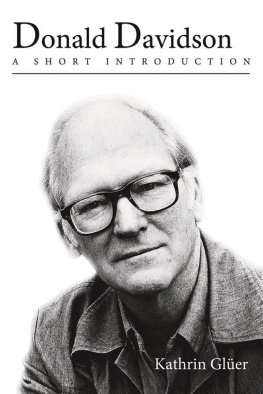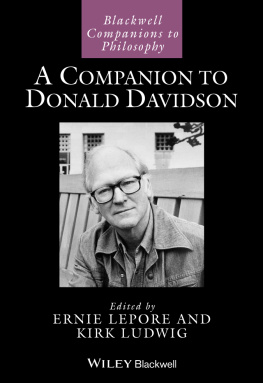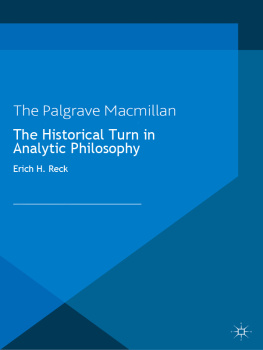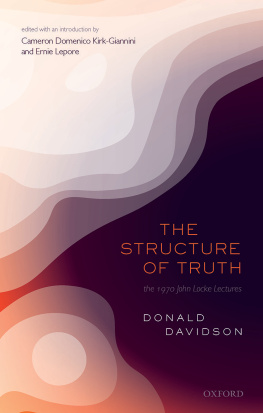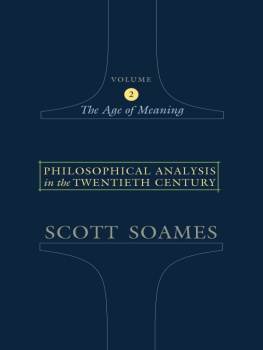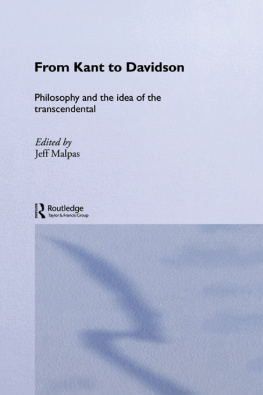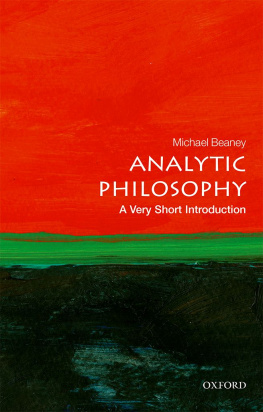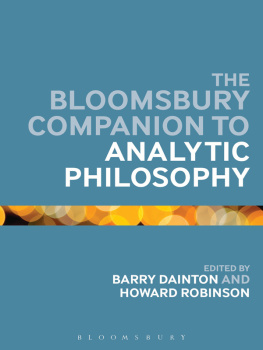DONALD DAVIDSON
Donald Davidson
A Short Introduction
Kathrin Gler


Oxford University Press, Inc., publishes works that further. Oxford Universitys objective of excellence in research, scholarship, and education
OxfordNew York
AucklandCape TownDar es SalaamHong KongKarachi
Kuala LumpurMadridMelbourneMexico CityNairobi
New DelhiShanghaiTaipeiToronto
With offices in
ArgentinaAustriaBrazilChileCzech RepublicFranceGreece
GuatemalaHungaryItalyJapanPolandPortugalSingapore
South KoreaSwitzerlandThailandTurkeyUkraineVietnam
Copyright 2011 Oxford University Press
Published by Oxford University Press Inc.,
198 Madison Avenue, New York, New York 10016
www.oup.com
Oxford is a registered trademark of Oxford University Press.
All rights reserved. No part of this publication may be reproduced, stored in a retrieval system, or transmitted, in any form or by any means, electronic, mechanical, photocopying, recording, or otherwise, without the prior permission of Oxford University Press.
Library of Congress Cataloging-in-Publication Data
Gler, Kathrin, 1966
[Donald Davidson zur Einfhrung. English]
Donald Davidson : a short introduction / Kathrin Gler.
p.cm.
Includes bibliographical references (p.).
ISBN 978-0-19-538296-9 (hardcover: alk. paper)
ISBN 978-0-19-538297-6 (pbk.: alk. paper)
1. Davidson, Donald, 1917-2003.I. Title.
B945.D384G58132011
191dc222011006715
ISBN 978-0-19-538296-9 (Pbk.)
978-0-19-538297-6 (Hbk.)
CONTENTS
2. Radical Interpretation:
Davidsons Philosophy of Language
This book aims at providing a short and crisp introduction to the philosophy of one of the twentieth centurys deepest analytic thinkers: Donald Davidson. It is based on an earlier, shorter book written in German: Donald Davidson zur Einfhrung (Hamburg: Junius Verlag, 1993). What most clearly remains from the earlier version is the basic idea of the overarching shape and design of Davidsons wide-ranging but highly interconnected work. Using the radical interpreter as a guide results in the rather straightforward, systematic structure of both books. I have substantially rewritten and updated large parts of the original, however. Of course I have also corrected mistakesand no doubt made some new ones.
Of all the people who have helped me along the way, I would like to especially mention these: Donald Davidson was always there and most generously answered all my questions when I was working on the German version. Daglinm Fllesdal was a most discerning early reader and thoughtful critic. John Perry not only rediscovered the book, but also most kindly helped with getting the present version on its way. And Peter Pagin provided most valuable comments and support at all times.
Donald Davidson was one of the twentieth centurys greatest philosophers. When he died in 2003, at the age of eighty-six, he had not only lived a wondrously rich life, but also made important, often seminal contributions to most of the core areas of philosophy. A plane-spotter on an American aircraft carrier during World War II, he put on plays by Aristophanes in collegein the original Greek, and with musical scores by Leonard Bernstein. Later, he taught at some of the greatest American universities, amongst them Princeton, Stanford, and Berkeley. He loved to play music for two pianos with his wife, and enjoyed all sorts of outdoor activities including surfing, skiing, and mountain hiking. His philosophical interests ranged from general theory of meaning and content to formal semantics, the theories of truth, explanation and action, metaphysics and epistemology. Davidson was one of those rare figures who simply could not enter any discussion without significantly reshaping it; contemporary philosophy of mind and language in particular would not at all be the same without him.
An analytic philosopher of great rigor and originality, Davidson presents us with arguably the most systematic and coherent vision of the human mind and its relation to the world offered by any philosopher since the great system builders of centuries past. The profound humanism of this vision brought Davidson fame well beyond the circles of analytic philosophy and the Anglo-Saxon world. His singular ability to fruitfully combine an analytic perspective with its emphasis on logic, argument, and a scientific stance, with aspects of humanistic thought, gives Davidsonian philosophy its distinctive character.
The history and present gestalt of twentieth century philosophy of mind and language cannot be fully appreciated without at least a basic understanding of Davidsons work. The interest of this work, however, is by no means limited to the historian; even though few share Davidsons grand vision today, the arguments behind his often radical views remain eminently relevant to present interests and discussions. A basic familiarity with these arguments is a must for anyone interested in reading or doing philosophy of mind and language today: You simply have to know your Davidson.
Minded creatures, Davidson held, are essentially rational animals. And rational animals are interpretable animals. Their minds are essentially public; they are in principle accessible to their interpreters, other rational animals understanding what they say, think, and do. The interpreter thus is the hero, the main character of Davidsons philosophy.
Mental states such as beliefs and desires never come alone; according to Davidson, they always form whole systems, systems possessing a basic, internal coherence and rationality. This rationality extends to actions as well; the actions of a rational animal can be explained by the reasons provided for them by its mental states, its beliefs, and desires. At the same time, there are systematic, foundational relations between mind, behavior, and the surrounding world of objects and events. The contents of a creatures mind depend in systematic and observable ways on these objects and events, as well as on its behavior. And the same holds for the meanings of such a creatures words.
Indeed, Davidson most provocatively claimed the circle of rational animals to be quite select: Only creatures with language belong to it. Language and thought are interdependent; no thought, and thus no mind, without language. Davidson held many very controversial doctrines. He argued for the veridical nature of belief; in any whole system of beliefs, any particular belief might be false but the vast majority of background beliefs is bound to be true. Hence, Davidson thought that no general philosophical skepticism, be it skepticism about the external world, ones own or other minds, can even get off the ground. Davidson defended semantic holism, but disputed the conventional nature of linguistic meaning. He held that no solitary creature can have a language, but was at the same time convinced that the idea of communally established, shared meanings is philosophically utterly uninteresting. Rather, he conceived of meaning in not only individualistic, but even occasional terms; the meanings of words are established anew in any particular communicative exchange, be it ever so short-lived. Davidson revolutionized the theory of action explanation by showing how reasons explanations can be conceived of as causal explanations. He pioneered a sophisticated, decision-theoretically informed belief-desire model of practical reasoning. At the same time, Davidson conceived of the mental and the physical as irreducible realms each possessing their own right and value. While large parts of analytic philosophy were in the grips of naturalistic reductionismthe idea that the mental in some sense can be reduced to the physicalDavidson firmly held on to a more humanistic anti-reductivism. While retaining the thought that there is just one neutral ontology of objects and events, Davidson resisted physicalism in all its forms, holding no one way of describing the world to be privileged above, or more basic than, the others. The foundational relations between the semantic and the non-semantic, the mental and the nonmental, the rational and the nonrational, Davidson concluded, have to be conceived of as holistic relations of global supervenience.

